|
|
|
Sort Order |
|
|
|
Items / Page
|
|
|
|
|
|
|
| Srl | Item |
| 1 |
ID:
183686


|
|
|
|
|
| Summary/Abstract |
Capitalist progress implies the destruction of the old and uncompetitive sectors and the creation of new ones in their wake. However, in the Global South the loss of jobs in the older sectors is not necessarily offset by the new forms of employment. The objective of this paper is to critically examine how the vast employment in the Indian handloom sector could be sustained, given the competitive pressures from alternative technologies and products. Rather than allow the sector to be a victim of capitalist progress, this paper on moral economy grounds offers an alternative approach, which is to boost the demand for handloom products through commercial branding but one that is rooted in cultural valorization of artisanal craft. This strategy, complementary to state provisioning of subsidized inputs, comes at the expense of authenticity but is expected to enhance consumption and sustain livelihoods in the handloom sector.
|
|
|
|
|
|
|
|
|
|
|
|
|
|
|
|
| 2 |
ID:
183683


|
|
|
|
|
| Summary/Abstract |
Consanguineous marriage is still a preferred option in many societies of southern India. Therefore, this study addresses the state and district wise variation in consanguineous marriages and also attempts to find out the underlying factors of this practice in different marriage cohorts of South India. Drawing data from National Family Health Survey-4, the result revealed that there is a reduction in consanguineous marriages from 32.6% who married before 1985 to 23% during 2010–2014. About 13 districts in Tamil Nadu had the highest prevalence of consanguineous marriages, indicating that recent socio-demographic changes such as delays in age at marriages, lesser age gaps between partners, increase in the level of education, etc., did not explicitly affect the consanguineous marriages.
|
|
|
|
|
|
|
|
|
|
|
|
|
|
|
|
| 3 |
ID:
183680
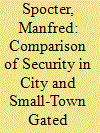

|
|
|
|
|
| Summary/Abstract |
Gated developments are a defining feature of the post-apartheid residential landscape. The fortification practices witnessed in gated developments are part of a wider securitisation of the South African urban- and ruralscapes. This research resides in the ambit of the theory of crime and violence as a precursor to the growth in gated developments. Research on gated developments has tended to focus on their proliferation in larger urban settlements, with scant attention being paid to gated developments in smaller settlements and in rural areas. However, non-metropolitan gated developments are a reality, and they display similar security features as those found in metropolitan areas. This paper compares the security levels of gated developments in a suburb of Cape Town with those in small towns in the Western Cape province. Security features are quantified to determine whether differences in securitisation levels exist between the locales. The gated developments in the city display higher levels of security than those in small towns. However, a closer analysis of small-town gated developments reveals high security levels in towns where tourism is the mainstay of the local economy. As the technology of security migrates from military applications to residential applications, a securified small-town future is a real possibility.
|
|
|
|
|
|
|
|
|
|
|
|
|
|
|
|
| 4 |
ID:
183687
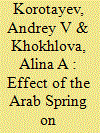

|
|
|
|
|
| Summary/Abstract |
In the Middle East and North Africa (MENA) region after the Arab Spring, monarchy has turned out to be a far stronger negative predictor of destabilization than it was before 2011. For the MENA, the period after 2010 can be subdivided into three periods: a mass protests period (2011–2012), the period of explosive growth of radical Islamist activities (2013–2016), and the second mass protest period (since 2016). Our analysis demonstrates that monarchies’ stabilization capacity was preserved in 2011–2012 and grew substantially during 2013–2016, as MENA monarchies turned out to be more resilient in the face of the outbreak of radical Islamism in the region.
|
|
|
|
|
|
|
|
|
|
|
|
|
|
|
|
| 5 |
ID:
183688
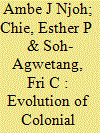

|
|
|
|
|
| Summary/Abstract |
The study examines Germano-Anglo colonial towns in Cameroon to determine factors accounting for the scarcity of infrastructure as well as streets and places with Eurocentric names. Using primary and secondary data, it demonstrates that the lack of infrastructure in the polity is a function of negligence by colonial and post-colonial authorities. With few pieces of public infrastructure, the authorities have had few streets and places to attribute names from Eurocentric lexical dictionaries. These findings contribute to knowledge of the relative impact of endogenous and exogenous factors on toponymic traditions as well as inter-country differentials in African countries’ development profiles.
|
|
|
|
|
|
|
|
|
|
|
|
|
|
|
|
| 6 |
ID:
183682


|
|
|
|
|
| Summary/Abstract |
With modernization, ideological shifts and economic interdependency, the concept of globalization has expanded vastly. Though the world is unipolar, still the international competition remains prevalent that poses serious threats to regional conflicts. The great powers of the world are still competing with each other for influence over other countries. Thus, the role of militarization cannot be ignored in this context. Thus, it would be interesting to examine the impact of military expenditures on the globalization process through the spill-over effects, along with their relationship with economic growth. The study employed panel data consisting of African countries, covering the time period from 2001 to 2014. The econometric estimation is done through the application of spatial econometric techniques, that is, the spatial autoregressive fixed effect model and spatial Durbin fixed effect model. The study has found a positive relationship between economic growth and globalization but a negative relationship was found between military expenditures and economic growth.
|
|
|
|
|
|
|
|
|
|
|
|
|
|
|
|
| 7 |
ID:
183689


|
|
|
|
|
| Summary/Abstract |
The circumstances prevailing in South Asia (SA) have led to a plateauing migration stream that has resulted in several categories of migrants. The underlying factors driving migration have been identical in all the countries of SA. In recent years, however, poverty, conflicts, political and religious persecution, natural disasters and climate change have emerged as the most prominent drivers. External migration flow from SA has more than doubled between 2000 and 2015. This is a dynamic region, with millions (over 38m in 2017) of people crossing borders, both intra-regionally and extra-regionally. In recent years, wealthy citizens from SA have begun to move out of their countries with the intention of settling down elsewhere. This tendency has raised concerns among the policy makers because they create the grounds for reverse remittance flows. This research is meant to identify and contribute to the discourse of a new category of migrants (non-conventional migration) who are different from those in the conventional migration stream that included economic and forced migration. This research has crucial policy implications for both origin and destination countries.
|
|
|
|
|
|
|
|
|
|
|
|
|
|
|
|
| 8 |
ID:
183685


|
|
|
|
|
| Summary/Abstract |
Following several online and offline ethno-religious tensions in 2018 and 2019, social media (Facebook in particular) has become one of the scapegoats for instigating ethnic intolerance in Sri Lanka. Conjecture suggests that increased religious commitment and frequently shared religious expressions on social media are responsible for provoking ethnic intolerance. Against that backdrop, the present study investigates to what extent Facebook graphics expressing out-group intolerance are associated with in-group religious identification by analysing a sample of graphics posted on Facebook by a Sinhala-Buddhist community from 2011 to 2018. The findings reject the religious rationale and reveal that increased in-group religious identification does not necessarily characterize ethnically intolerant visual content on Facebook. Instead, online ethnic intolerance can be better attributed to threat perceptions and conspiracy theories.
|
|
|
|
|
|
|
|
|
|
|
|
|
|
|
|
| 9 |
ID:
183681
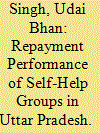

|
|
|
|
|
| Summary/Abstract |
This paper aims to study the determinants of repayment performance of self-help groups in India’s Uttar Pradesh state, which has one of the highest numbers of defaulting self-help groups. The study is based on primary data collected in 2017 through a field survey covering 300 members across 100 self-help groups from the rural areas of Sultanpur and Faizabad districts. The survey reveals an overall repayment rate of about 55% with better pay-back performance seen among members of old self-help groups. The results, computed with the help of the Tobit model, show that factors such as group maturity (age of the group), ratio of family workers to household size and household income are negatively associated with the incidence of delinquency while peer group pressure and social ties associate positively with delays and overdues.
|
|
|
|
|
|
|
|
|
|
|
|
|
|
|
|
| 10 |
ID:
183691


|
|
|
|
|
| Summary/Abstract |
Instrumentation is a key factor in the theory and practice of land surveying. At various contexts, slow-paced technology adoption is a major setback to professional practice. Within the context of land surveying, such a die-hard situation, which has almost assumed a ‘sailing ship effect’ spurs interest in high-end surveying equipment, for example terrestrial laser scanners (TLS). Research regarding this important issue is scarce in the scientific journal and often provides generalised findings. Thus, specific determinants of modern TLS adoption at spatial contexts (countries and individual cities) are unknown, and this is a major knowledge gap which undermines response efforts. Our aim in this study is to examine the factors related to slow-paced adoption of TLS in Nigeria. We formulated the hypothesis of the study based on the capacity mapping model (CMM) and used semi-structured questionnaires to collect primary data on land surveyors in Enugu – a major hub of geoinformation and land surveying operation in Nigeria. We used descriptive statistics in SPSS to analyse the data, and explore patterns, trends, and interdependencies between the variables we measured in the study. Results show a good depiction of surveying practice in the study area, although cadastral services, engineering surveying, and land information management (LIM) represent the dominant surveying operations. These dominant operations, which often require basic logistics to implement, are key evidence of the slow-paced adoption of TLS. The contributing factors to this situation are lack of funds, poor technical capacity, and the shrinking value and scope of work exclusive to traditional land surveying. We corroborate these findings with evidence of land surveying experience in other developing countries. We therefore argue that future development of land surveying in the developing countries is subject to compliance with current global professionalism, which is possible only if more land surveyors base their competences on a successful adoption of modern technology.
|
|
|
|
|
|
|
|
|
|
|
|
|
|
|
|
| 11 |
ID:
183684


|
|
|
|
|
| Summary/Abstract |
Contemporary Algeria was born after 132 years of colonization and a bloody decolonization war that lasted almost eight years. The official version and the dominant historical narrative of the war of independence has been influencing the state-owned media, the process of memorialization and the education system for years. This article will focus on how history was manipulated and used to legitimate political power using ordinary legislation as well as the highest source of law: the constitution. This article argues that by studying Algerian legislation and the various constitutional charters we can obtain key insight into ways in which the triad of the state, the party, and the army has been able to reproduce and re-appropriate symbols and narratives of the nation through constitutional measures and/or amendments.
|
|
|
|
|
|
|
|
|
|
|
|
|
|
|
|
| 12 |
ID:
183690
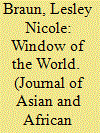

|
|
|
|
|
| Summary/Abstract |
Located in the manufacturing hub of Shenzhen is Window of the World: a Chinese theme park that features miniature copies of heritage sites from around the world. The individuals living within this constructed simulation are imported from diverse countries. They come to work as performers, animating the different cultural pavilions. As such, the transnationalism made possible by this park provides a window through which we can observe cultural interactivity, as well as the ways in which culture is constructed and re-presented. This article examines some of the processes of cultural encounters through copies of commodified cultural heritage. It also sheds light on the ways in which Kung Fu movies circulating in Africa have inspired the imaginations of young people, revealing cultural feedback loops that provide openings for new contact. Grounded in ethnographic research, the findings here are based on interviews with Kenyan and South African contract workers at this theme park. This article explores young people’s pursuits of new opportunities of identity-formation and self-representation, as well as economic stability and forward mobility.
|
|
|
|
|
|
|
|
|
|
|
|
|
|
|
|
|
|
|
|
|